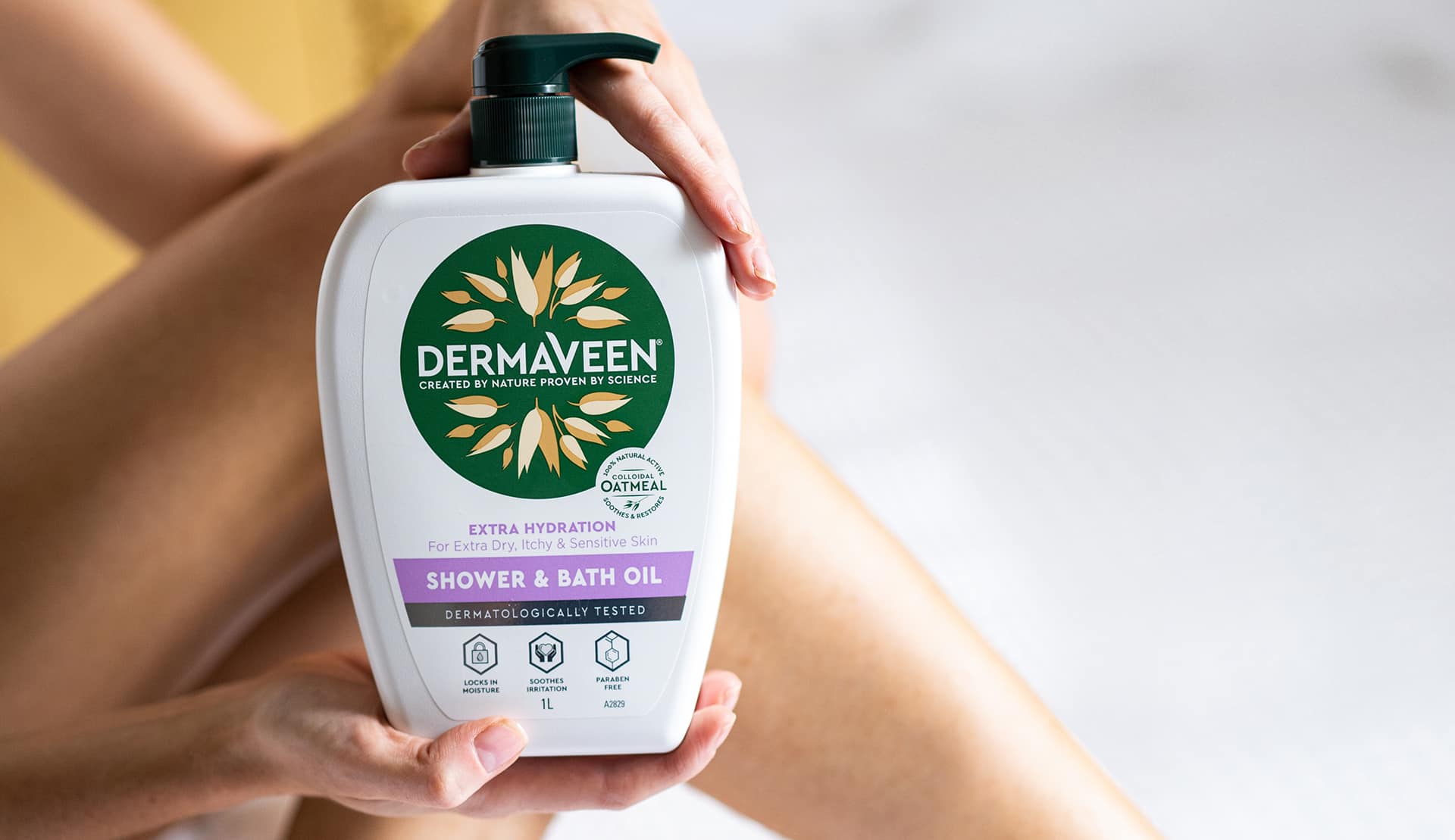
All About Eczema-prone Skin
The core principle for managing eczema-prone skin is to moisturise, moisturise. See how the DermaVeen Sensitive Relief Calmexa® range can help you.
What is eczema-prone skin?
In order to understand what eczema-prone skin is, you need to understand how the top layer of the skin works. The outermost layer of your skin is called the stratum corneum (SC) and is the first line of defence for your body. It’s job is to help keep water in and irritants (like allergens and microbes) out, forming a protective barrier. In everyone’s skin, the SC is made up of dead skin cells that are regularly replaced with cells from deeper skin layers. These SC cells are squished flat and held together by a lipid matrix – imagine a brick wall where the skin cells are the bricks, and the lipid matrix is the mortar holding them together.
The lipid matrix is made up of free fatty acids, cholesterol and ceramides – and when one or more of these elements are missing or malformed the protective properties of the SC are compromised. In other words, as the SC is weakened, water can get out and irritants can get in. This is what happens in eczema-prone skin – your skin barrier becomes impaired and your skin can feel sensitive, dry and itchy.
This is why it is essential for people with eczema-prone skin to keep their skin well moisturised – to try and help the SC function as well as possible.
Management of eczema-prone skin
The core principle for managing eczema-prone skin is to moisturise, moisturise and, you guessed it – moisturise. This is important to help your SC do its job. The Australasian Society of Clinical Immunology and Allergy (ASCIA)1 recommends moisturising your face and body twice a day and avoiding soaps and perfume products that can further damage or dry out your skin.
Another key factor is avoiding things that irritate your skin. These can include scratching, swimming in chlorinated swimming pools, sand, carpets or grass, perfumes, soaps, woollen or synthetic fabrics, overly hot environments, animals or dust mites.
1. Australasian Society of Clinical Immunology and Allergy. Information for patients, consumers and carers: Eczema (atopic dermatitis) [Internet]. ASCIA 2019. Available from: https://www.allergy.org.au/images/pc/ff/ASCIA_PC_FAST_FACTS_Eczema_2023.pdf
Benefits of colloidal oatmeal for eczema-prone skin
Oats or Avena sativa, have been used for their skin care benefits for centuries. The term ‘colloidal’ means super fine particles which are dispersed throughout another substance. In the case of colloidal oatmeal we are talking about finely ground whole oat kernels that are no more than 0.15 mm big. Moisturisers and cleansers containing colloidal oatmeal have been found to help relieve sensitive and dry, itchy skin. Research has shown that colloidal oatmeal contains elements like avenanthramides which soothe itch and irritation, high concentrations of starch and beta-glucan which helps prevent skin water loss and saponins which help cleanse the skin.
The DERMAVEEN range with OatActiv+® hydrates & protects dry & sensitive skin by locking moisture in, soothing skin prone to itch, and its prebiotic properties support a healthy skin microbiome, so it helps skin get back to how it should be. OatActiv+ is a 100% natural colloidal oatmeal that provides skin care benefits in 6 ways:
- Hydrates by acting as a natural emulsifier and humectant, to soften skin
- Prevents skin moisture
- Soothes skin prone to itch and irritation through antipruritic and antioxidant properties
- Protects by restoring the fatty matrix between skin cells helping replenish the skin barrier
- Balances the skin’s normal pH levels*
- Supports skin barrier restoration and repair.
*DERMAVEEN washes, lotions and creams are pH balanced
The what, why and how of eczema-prone skin
A key component of managing eczema-prone skin is moisturising regularly, and colloidal oatmeal is an ingredient that has been shown to help relieve the dryness and itch of eczema-prone skin.
Frequently asked questions about eczema-prone skin
Sensitive, eczema-prone skin can appear to come and go and may be triggered by certain irritants. That’s why it’s important to look after your skin to help support the protective barrier layer by moisturising regularly.
Sensitive, eczema-prone skin can feel worse in winter as the cold dry air in winter and dry air from indoor heating can irritate your skin.
Some people find that sunlight is a trigger for their sensitive, eczema-prone skin which is why it is important to always protect your skin with sunscreen when outdoors.
NZ-2024-06-0025
